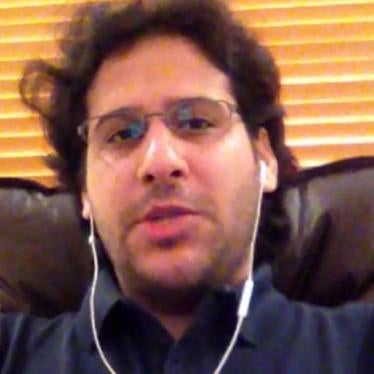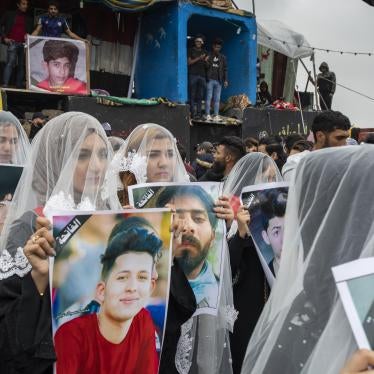(New York) - Syrian authorities should reveal the fate of at least 17 men held in incommunicado detention by members of the security services since August and September 2008, Human Rights Watch said today.
The security services detained 13 men during an August crackdown on individuals from the northeastern district of Deir al-Zawr suspected of having ties to Islamists. Another group, detained in September, was of Syrian Kurds from the towns of Qamishli and `Ifrin suspected of belonging to an armed group called the Movement to Liberate Kurdistan (Haraket Tahrir Kurdistan). The body of one of those detained in Deir al-Zawr, Muhammad Amin al-Shawa, 43, was returned to his family on January 10, 2009, but they were allowed to see only his face before he was buried. Three Syrian human rights activists told Human Rights Watch that they believe that al-Shawa died under torture.
"Syrian authorities should order an investigation into the death of Muhammad al-Shawa and hold those responsible accountable," said Sarah Leah Whitson, director of the Middle East and North Africa division at Human Rights Watch. "The authorities also should reveal the fate of the other detainees and immediately free them or charge them."
A relative of one of the detainees from Deir al-Zawr said that Syrian security services freed three of the men but kept the other 10 in detention. The authorities have not disclosed where the men are being held, why they were arrested or whether they will be charged and put on trial. One of those still in detention is Nabil Khlioui, 49, an electrician at a local telecommunications company. He was arrested in his home at 3 a.m. on August 14, by members of the security services dressed in civilian clothes, one of his relatives said. He had information, he said, that security initially held him at a branch of military intelligence in Damascus called the Palestine Branch, but later transferred him to another detention facility.
The relative told Human Rights Watch: "Our most basic human right is to know whether he is dead or alive. They won't even tell us that."
The other known detainees from Deir al-Zawr are: Husam Muhammad; Thabet al-Hassan; Mahmud Dameem; Abdel Hadi al-Salameh; Muhammad Taha; Bilal Hashem Sufian; Abdel Razzak al-Kubaysi; and Iyad al-Hussein.
The Syrian Kurds being held were suspected by the authorities of ties to the Movement to Liberate Kurdistan, which was formed after clashes between Kurdish demonstrators and security forces in March 2004 in the northern city of Qamishli that left more than 30 dead. Following violent attacks by the security services on unarmed protesters in Qamishli, armed men attacked a Syrian police station and a military intelligence patrol, allegedly killing two policemen. The Syrian security services suspect the Movement of being responsible for the attacks.
A member of the group who escaped arrest told Human Rights Watch that Syrian security services, and notably the security branch called State Security, detained 18 men in the September operation, accusing them of ties to the group even though some of them were not members. According to the member, none of the detained men has been released. He provided Human Rights Watch with the names of eight of the detainees: Munzer Oscan and his two brothers, Nehad and Riad; Munzer's cousin, Kawa Oscan; Kadar Ali Rasho and his two brothers, Bengin and Lokman; and Abdel Baki Khalaf.
The Syrian security forces have not released any information on those detained and have not allowed any of the detainees contact with the outside world.
"Syrian security services regularly ‘disappear' someone for a few months before referring them to a sham trial," Whitson said. "President Assad will not be able to promote Syria's stature internationally unless he puts an end to these serious crimes of disappearances and allow all detainees immediate access to their families and lawyers."






